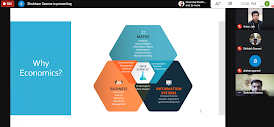The companies and the institutions have realized that there is a need to hire data scientists. Academic institutions are putting in their best efforts to scramble in courses of data sciences in their curriculum. Many professionals and institutions even tout data science as a hot career choice. However there is confusion about what exactly data science is, and this confusion could lead to disillusionment as the concept diffuses into meaningless buzz. Therefore in this article, we discuss what exactly data science is and how it's put into action in the present scenario and drives decision making.
With the huge amount of data available, companies in almost all sectors tend to exploit data for their competitive advantage. The volume and category of data available have outstripped the capacity of human analysis. On the other hand, the technology has grown so rapidly and algorithms have been developed that can connect broader databases and provide results efficiently and effectively that too in a shorter period. This has given rise to the increasing application of data sciences. , data science is a set of fundamental principles that support and guide the principled extraction of information and knowledge from data. The principle and techniques of studying these algorithms through data science are recommending in almost all kinds of marketing tasks ranging from targeted marketing, online advertising to understanding consumer behavior and maximizing profit.
Data science involves principles, processes, and techniques for understanding phenomenon via the analysis of data. The ultimate goal of any enterprise or company is decision making to which data science acts as a driving force through its analysis. Data-driven decision-making refers to the practice of basing the decision on the analysis of data rather than purely on intuition.
knowledge and the discoveries that will be made out of the technical solutions. The fundamental concept of data science can be summarized through the following pointers:
Extracting useful language from data to solve business problems can be treated systematically by following a process with reasonably well-defined stages.
Evaluating the data science results require careful consideration of the context in which they will be used.
The relationship between the business problems and the analytics solution often can be decomposed into traceable and be solved subproblems.
Even if a small set of data is studied then also focus and importance should be laid upon minor details.
Therefore from the above discussion and all the points stated, it draws out the conclusion that data science is an extensive and popularly growing course which is proving to be useful in every industry or corporate houses. A large portion of the success of these industries and corporate giants owes to the application of data science. Data science supports data-driven decision-making and sometimes also aids in making automated decisions from massive data. However, the fundamental concepts of data science are of their own and should be considered and discussed explicitly to determine the real potential of data science.
Written by- Arnav Jain
















